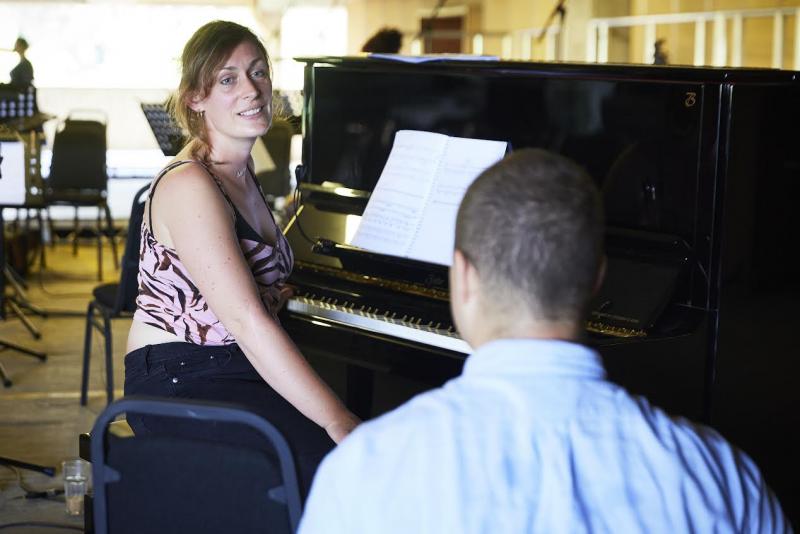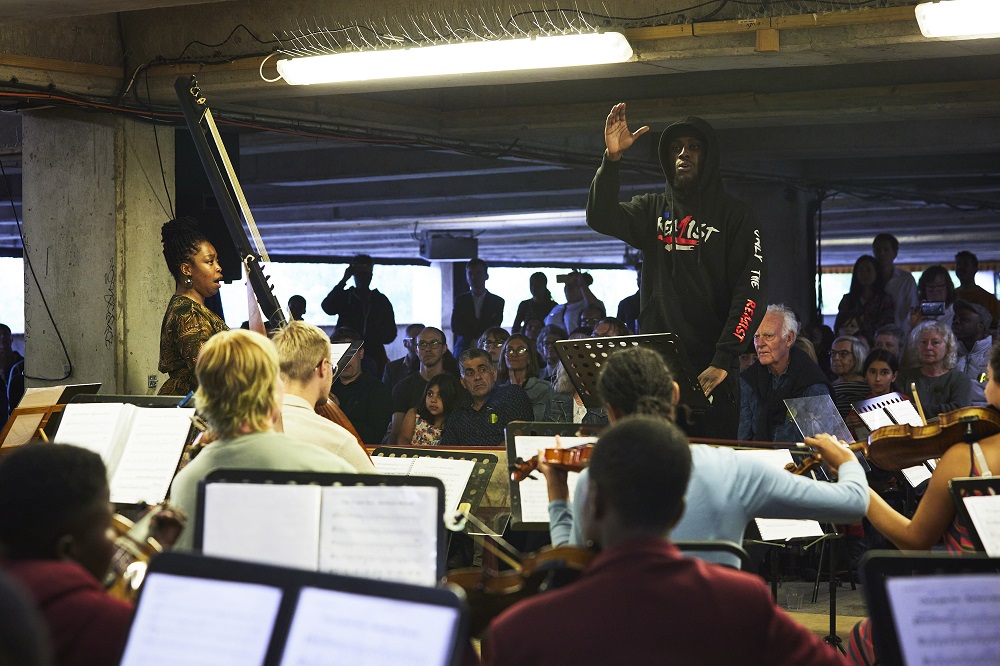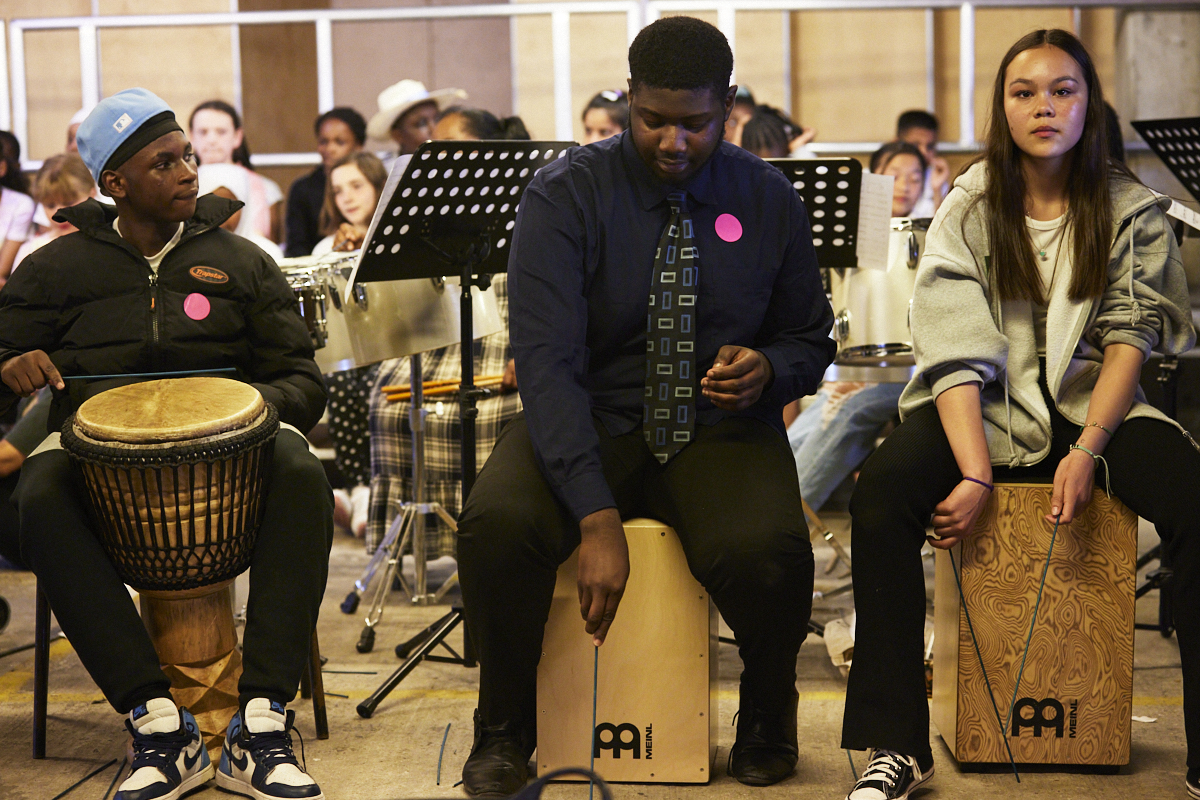First Person: composer and co-founder of The Multi-Story Orchestra Kate Whitley on car-park creativity | reviews, news & interviews
First Person: composer and co-founder of The Multi-Story Orchestra Kate Whitley on car-park creativity
First Person: composer and co-founder of The Multi-Story Orchestra Kate Whitley on car-park creativity
Enabling young people from all walks of life to be themselves in a wonderful environment

We started The Multi-Story Orchestra back in 2011 with a group of friends when we’d left university. Conductor Christopher Stark and I basically wanted to find new ways to play orchestral music that would escape formal concert halls and be more exciting and more accessible.
We thought car parks might be good places to try – they’re big, they’re open, and people don’t really associate them with anything in particular. We started off playing in a car park in Peckham, run by Bold Tendencies, and we now play there every summer. We’ve also played in other car parks around the country – in Gloucester, Ipswich, Birmingham, Portsmouth and more.
We basically did it because car parks are more fun than formal concert halls. It gives you so much more flexibility in the atmosphere you can make. The audience can be much closer to the musicians and the atmosphere is more creative and more open. I also love the fact that you are aware of what is going on in the outside world in the car park. We’re one level below the roof, which means we’re covered from the weather, but you get a great view out the sides. You can hear things like the trains going by and traffic, but it never really gets in the way. People always say they find it moving and that it adds to it.  I never imagined I would spend my life running an orchestra that plays in car parks! And although playing in car parks is probably something we’ll always do, some of the most amazing things we’ve discovered and experienced along the way go beyond the fact that it’s in a car park– what it’s really about is finding new and better ways to create music. The core of what we do is going into schools to create big ensembles of choirs and instrumentalists who then perform with our professional orchestra. We don't do this as an "education" project – we do it because those young people bring the most amazing creative and musical energy. It means we can create incredibly moving musical experiences that also celebrate the beauty and diversity of the local community.
I never imagined I would spend my life running an orchestra that plays in car parks! And although playing in car parks is probably something we’ll always do, some of the most amazing things we’ve discovered and experienced along the way go beyond the fact that it’s in a car park– what it’s really about is finding new and better ways to create music. The core of what we do is going into schools to create big ensembles of choirs and instrumentalists who then perform with our professional orchestra. We don't do this as an "education" project – we do it because those young people bring the most amazing creative and musical energy. It means we can create incredibly moving musical experiences that also celebrate the beauty and diversity of the local community.
This is incredibly important to us, and I’m really proud that some of the young people we’ve known for many years are now key members of the team and leaders in our creative work.
In response to the death a few years ago of Malcolm Mide-Madariola – an ex pupil from their school – some of our young people asked us to help them create a piece called The Endz as a tribute and to give their perspective on gang culture through music.
This developed into an incredibly powerful piece – it’s mad how many people who came to see it said it was one of the best things they’d ever seen, and so many people cried. There’s a highlights film of it here:
I think the really amazing thing about The Endz was how much ownership everyone in it had, and how much it mattered to tell that story. That’s what made it different from what the orchestra had done before, because it really gave it a purpose. It led us into a new way of making music where we develop young people into artists and leaders and enable them to tell their own stories through music. I believe that the most moving art is created through this authenticity: these are powerful, radical voices that are vitally needed to make something good. So much of what we think of as "art" tends to uphold social inequalities and prejudices and exclude huge parts of our society. This is not ok.
For me, the most powerful, meaningful artistic experiences are the ones that break that – and tell stories that might not be heard otherwise. In a society where inequality and discrimination are so widespread it’s really important to question what’s there, and to break the structures around us. Art at its best is an opportunity to bring people together and imagine a different world. I’m not saying that we at Multi-Story Orchestra have completely cracked that yet but it’s something to aim for.  I think this is one of the reasons why music is so important for young people – particularly when music education is declining in schools. Music – and especially creative music making – can be a way for people to feel powerful, to relate to others, and to be celebrated for things that the normal world might not see or celebrate. We now have a group of 11 Young Creatives in the orchestra, and I am constantly amazed by their dedication, insight, and creativity. It’s amazing to see and consistently inspiring.
I think this is one of the reasons why music is so important for young people – particularly when music education is declining in schools. Music – and especially creative music making – can be a way for people to feel powerful, to relate to others, and to be celebrated for things that the normal world might not see or celebrate. We now have a group of 11 Young Creatives in the orchestra, and I am constantly amazed by their dedication, insight, and creativity. It’s amazing to see and consistently inspiring.
Part of this, I think, is because we’ve enabled them to be part of something where they can be themselves. Rapper and drummer Toni, whom we’ve known since he sang with the orchestra in primary schools, said “Multi-Story is a place where you can be your creative self – you can be whatever you want to be” – which I think really sums up what it should be about. Being able to create, especially with other people, has helped me through all kinds of difficult times, and I think it’s really important for everyone.
Another of our young people – 18-year-old Flame – is an incredible performer and I was really surprised when she told me that she really struggled with confidence before. She told me being able to be on stage and perform something that was hers “made me feel invincible, and I never want to let go of that feeling, regardless of what I do with my life.” I don’t think there are many things more important than that.
Explore topics
Share this article
The future of Arts Journalism
You can stop theartsdesk.com closing!
We urgently need financing to survive. Our fundraising drive has thus far raised £49,000 but we need to reach £100,000 or we will be forced to close. Please contribute here: https://gofund.me/c3f6033d
And if you can forward this information to anyone who might assist, we’d be grateful.

Subscribe to theartsdesk.com
Thank you for continuing to read our work on theartsdesk.com. For unlimited access to every article in its entirety, including our archive of more than 15,000 pieces, we're asking for £5 per month or £40 per year. We feel it's a very good deal, and hope you do too.
To take a subscription now simply click here.
And if you're looking for that extra gift for a friend or family member, why not treat them to a theartsdesk.com gift subscription?
more Classical music
 Hallé John Adams festival, Bridgewater Hall / RNCM, Manchester review - standing ovations for today's music
From 1980 to 2025 with the West Coast’s pied piper and his eager following
Hallé John Adams festival, Bridgewater Hall / RNCM, Manchester review - standing ovations for today's music
From 1980 to 2025 with the West Coast’s pied piper and his eager following
 Kaploukhii, Greenwich Chamber Orchestra, Cutts, St James's Piccadilly review - promising young pianist
A robust and assertive Beethoven concerto suggests a player to follow
Kaploukhii, Greenwich Chamber Orchestra, Cutts, St James's Piccadilly review - promising young pianist
A robust and assertive Beethoven concerto suggests a player to follow
 Robin Holloway: Music's Odyssey review - lessons in composition
Broad and idiosyncratic survey of classical music is insightful but slightly indigestible
Robin Holloway: Music's Odyssey review - lessons in composition
Broad and idiosyncratic survey of classical music is insightful but slightly indigestible
 Classical CDs: Wolf-pelts, clowns and social realism
British ballet scores, 19th century cello works and contemporary piano etudes
Classical CDs: Wolf-pelts, clowns and social realism
British ballet scores, 19th century cello works and contemporary piano etudes
 Bizet in 150th anniversary year: rich and rare French offerings from Palazzetto Bru Zane
Specialists in French romantic music unveil a treasure trove both live and on disc
Bizet in 150th anniversary year: rich and rare French offerings from Palazzetto Bru Zane
Specialists in French romantic music unveil a treasure trove both live and on disc
 Scottish Chamber Orchestra, Ibragimova, Queen’s Hall, Edinburgh review - rarities, novelties and drumrolls
A pity the SCO didn't pick a better showcase for a shining guest artist
Scottish Chamber Orchestra, Ibragimova, Queen’s Hall, Edinburgh review - rarities, novelties and drumrolls
A pity the SCO didn't pick a better showcase for a shining guest artist
 Kilsby, Parkes, Sinfonia of London, Wilson, Barbican review - string things zing and sing in expert hands
British masterpieces for strings plus other-worldly tenor and horn - and a muscular rarity
Kilsby, Parkes, Sinfonia of London, Wilson, Barbican review - string things zing and sing in expert hands
British masterpieces for strings plus other-worldly tenor and horn - and a muscular rarity
 From Historical to Hip-Hop, Classically Black Music Festival, Kings Place review - a cluster of impressive stars for the future
From quasi-Mozartian elegance to the gritty humour of a kitchen inspection
From Historical to Hip-Hop, Classically Black Music Festival, Kings Place review - a cluster of impressive stars for the future
From quasi-Mozartian elegance to the gritty humour of a kitchen inspection
 Shibe, LSO, Adès, Barbican review - gaudy and glorious new music alongside serene Sibelius
Adès’s passion makes persuasive case for the music he loves, both new and old
Shibe, LSO, Adès, Barbican review - gaudy and glorious new music alongside serene Sibelius
Adès’s passion makes persuasive case for the music he loves, both new and old
 Anja Mittermüller, Richard Fu, Wigmore Hall review - a glorious hall debut
The Austrian mezzo shines - at the age of 22
Anja Mittermüller, Richard Fu, Wigmore Hall review - a glorious hall debut
The Austrian mezzo shines - at the age of 22
 First Person: clarinettist Oliver Pashley on the new horizons of The Hermes Experiment's latest album
Compositions by members of this unusual quartet feature for the first time
First Person: clarinettist Oliver Pashley on the new horizons of The Hermes Experiment's latest album
Compositions by members of this unusual quartet feature for the first time

Add comment